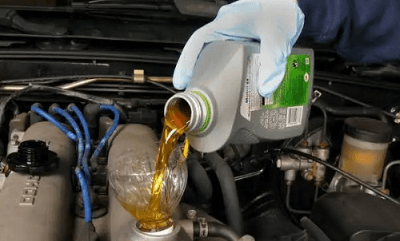No, transmission fluid should not be used as a substitute for brake fluid as they have different compositions and functions. Using the wrong type of fluid can cause damage to the braking system and compromise your vehicle’s safety.
Brake fluid is specifically formulated to handle the high temperatures and pressure within the braking system, while transmission fluid is designed for lubricating and cooling the transmission. It is important to use the recommended brake fluid for your vehicle to ensure proper braking performance.
Regularly checking and replacing brake fluid according to the manufacturer’s guidelines is essential for the safety and effectiveness of your brakes.
I. Transmission Fluid Vs Brake Fluid
Differences in Composition:
Transmission fluid and brake fluid are two distinct types of fluids with different compositions. Transmission fluid is specifically designed to provide lubrication and cooling for the transmission system. It contains a combination of additives and base oils to meet the specific requirements of the transmission.
Brake fluid, on the other hand, is designed to transfer force from the brake pedal to the brake components, such as the calipers and wheel cylinders. It is typically composed of glycol-ether or silicone-based fluids with specific boiling points and viscosity.
Variations in Functionality:
The functionality of transmission fluid and brake fluid also varies significantly. Transmission fluid is responsible for lubricating the gears, bearings, and other moving parts within the transmission system, ensuring smooth shifting and minimal wear.
In contrast, brake fluid is primarily responsible for transmitting hydraulic pressure to engage the brake pads or shoes against the rotors or drums, creating friction to slow down or stop the vehicle.
Impact on Performance:
Using transmission fluid as a substitute for brake fluid can have severe consequences on the performance and safety of your braking system. Brake fluid operates at higher temperatures and pressures than transmission fluid.
Therefore, using an incorrect fluid may lead to reduced braking efficiency, brake fade, or even brake failure. It is crucial to use the appropriate fluid recommended by the vehicle manufacturer to ensure optimal braking performance and safety.

Ii. Can Transmission Fluid Be Used As Brake Fluid?
II. Can Transmission Fluid be Used as Brake Fluid?
Exploring the Controversy: There is an ongoing debate about whether transmission fluid can be used as brake fluid. Some people argue that since both fluids have similar properties and functions, it should be safe to use transmission fluid as a substitute for brake fluid.
However, this is a controversial topic, and experts strongly advise against using transmission fluid in your vehicle’s braking system.
Analyzing the Risks: Transmission fluid is designed specifically for lubricating and cooling the transmission, while brake fluid is formulated to withstand the high temperatures and pressures involved in the braking system.
Using transmission fluid in your brakes can lead to decreased stopping power, increased brake fade, and potential damage to the brake components. Brake fluid also has different chemical properties, such as a higher boiling point, which is essential for preventing brake fluid from boiling under extreme heat.
Effect on Braking System: When transmission fluid is used in place of brake fluid, it can lead to reduced braking performance and potential brake failure. The consequences of using the wrong fluid can be severe, causing accidents and endangering lives.
It is crucial to use the correct fluid recommended by the vehicle manufacturer to ensure optimal braking performance and the safety of you and your passengers. Always refer to your vehicle’s owner’s manual for the appropriate type of brake fluid to use.
Iii. Risks And Consequences Of Swapping Fluids
Risks and Consequences of Swapping Fluids
Swapping transmission fluid for brake fluid can cause potential damage to the braking system, leading to safety concerns and legal implications. Brake fluid is specifically designed to withstand high temperatures and provide the necessary hydraulic force to stop the vehicle efficiently.
Transmission fluid, on the other hand, is formulated for lubrication and cooling purposes within the transmission system and is not suitable for use in the braking system.
Using transmission fluid as a substitute for brake fluid can lead to long-term effects on vehicle performance. It may result in decreased braking power, reduced responsiveness, and increased stopping distance. Furthermore, brake failure due to the inadequate performance of transmission fluid can lead to accidents and severe injuries.
In conclusion, it is crucial to use the correct fluid for each specific system in your vehicle. Swapping fluids can have detrimental effects on your braking system, compromising safety and potentially leading to legal consequences.
Iv. Importance Of Using Correct Fluids
IV. Importance of Using Correct Fluids
Recommended Fluid Specifications:
Using the correct fluids in your vehicle is crucial for its optimal performance and safety. Whether it’s for your transmission or your brakes, using the recommended fluid specifications is necessary to maintain the efficiency and longevity of these vital components.
| Advantages of Using the Right Fluids |
|---|
| 1. Improved Performance: The right fluids ensure smooth and precise operation of your vehicle’s transmission and brakes, enhancing overall performance. They aid in reducing friction, heat, and wear, maximizing efficiency. |
| 2. Enhanced Safety: By using the correct fluids, you minimize the risk of brake failure and transmission issues. These fluids have unique properties that are specifically designed to meet the demanding requirements of each system, providing optimal safety on the road. |
V. Tips For Maintaining Brake Fluid
Regular inspections and maintenance are essential for maintaining brake fluid in optimal condition. It is recommended to inspect the brake fluid level regularly, ideally every time the vehicle is serviced or the tires are rotated. Additionally, check for any signs of contamination or discoloration, which may indicate a need for fluid replacement.

Fluid replacement guidelines vary depending on the type of brake fluid used and the vehicle manufacturer’s recommendations. Brake fluid is hygroscopic, meaning it absorbs moisture over time, which can lead to decreased performance.
It is generally advised to replace the brake fluid every two to three years or as suggested by your vehicle’s owner’s manual.
Proactive measures can be taken to preserve brake fluid performance. These include avoiding harsh braking, as it generates excess heat and may cause the fluid to deteriorate faster.
Ensure the brake system is free from leaks, as they can introduce contaminants into the fluid. Regularly inspecting brake components, such as hoses and calipers, can help detect and address any potential issues before they escalate, thus safeguarding the integrity of the brake fluid.
Frequently Asked Questions For Can You Use Transmission Fluid For Brake Fluid
Can Transmission Fluid Be Used As Brake Fluid?
No, transmission fluid should not be used as brake fluid. Brake fluid is specifically formulated to withstand high temperatures and provide the necessary hydraulic pressure to operate the brake system effectively. Using transmission fluid as a substitute could compromise brake performance and safety.
Always use the recommended brake fluid for your vehicle.
Conclusion
While it may be tempting to use transmission fluid as a substitute for brake fluid in a pinch, it is not recommended. Brake fluid is specifically formulated to withstand the high temperatures and pressure in the brake system, whereas transmission fluid is designed for a different set of functions.
Using the correct type of fluid ensures the safety and performance of your braking system. So, always consult your vehicle’s manual or a professional mechanic for the appropriate fluid to use.


Leave a Reply